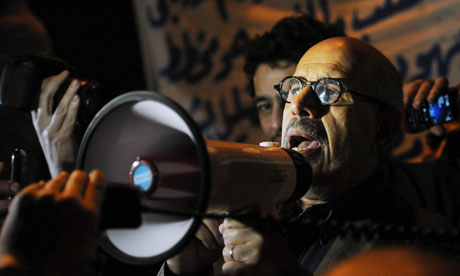Egypt protests: change is coming, says Mohammed ElBaradei
![]()
Thousands rally in Cairo to defy curfew as Hillary Clinton calls on Hosni Mubarak to allow ‘orderly transition’
Jack Shenker in Cairo and Ian Black, Middle East
Mohammed Elbaradei addresses crowds in Tahrir square in Cairo on another dramatic day of protests in Egypt. Photograph: Hannibal Hanschke/EPA
Egyptian opposition leader, Mohamed ElBaradei, tonight predicted change within “the next few days” as western leaders pointedly declined to throw their support behind the country’s embattled president, Hosni Mubarak.
In another dramatic day, thousands of protesters kept up the pressure on a defiant Mubarak amid sporadic violence and signs that the US and allies may ditch him unless he allows an “orderly transition”.
ElBaradei, the former top UN nuclear arms inspector and de facto leader of the opposition, called for the president to step down at once as demonstrators massed in Cairo’s central Tahrir Square to ignore a night-time curfew.
ElBaradei, who is now backed by the powerful Muslim Brotherhood and other opposition groups, said he wanted to negotiate about a new government with the army, which he described as “part of the Egyptian people”.
As crowds streamed towards the rally, military helicopters and F16 fighters flew overhead – an apparent show of force that provoked both fear and ridicule.
“The people want the regime to fall,” protesters chanted as ElBaradei walked to the centre of the square. Tanks, many scrawled with anti-Mubarak graffiti, were stopped from entering.
“You are the owners of this revolution. You are the future,” ElBaradei declared. “Our essential demand is the departure of the regime and the beginning of a new Egypt in which each Egyptian lives in virtue, freedom and dignity.”
Mubarak was shown earlier on state TV conferring with his newly appointed vice-president, the intelligence chief Omar Suleiman, and senior generals – a clear attempt to demonstrate that he enjoys the solid support of the armed forces. Western diplomats said they saw no sign the military was prepared to ditch the president.
Gunfire was heard coming from Cairo’s eastern districts last night, although reports suggested it was an exchange of fire between looters and soldiers.
In other key developments:
• Al-Jazeera TV was ordered to close because of its coverage of the protests.
• Thousands of prisoners, including Muslim Brotherhood activists, escaped from four jails.
• The death toll over the past six days was reported to have risen to 102.
• Large-scale protests erupted in Alexandria, Egypt’s second city, after the funerals of victims of the unrest.
• British nationals in Cairo, Alexandria and Suez were told to leave if it was safe.
• The US said it was organising flights to evacuate its citizens and urged all Americans in Egypt to consider leaving.
Underlining international concern about the continuing crisis in the Arab world’s largest country,
David Cameron and Barack Obama discussed Egypt in telephone discussions and called last night for an “orderly transition” to a democratic government. A spokesman for the prime minister, who is understood to have had a “difficult” conversation with Mubarak on Saturday, said that Cameron and the US president were “united in their view that Egypt now needed a comprehensive process of political reform”.
Hillary Clinton, the US secretary of state, said she wanted Egyptians to have a chance to chart a new future. But she added: “It’s not a question of who retains power. It’s how are we going to respond to the legitimate needs and grievances expressed by the Egyptian people.”
EU foreign ministers meeting in Brussels tomorrow are expected to echo that message. William Hague, Britain’s foreign secretary, told Sky News there had to be a shift to an “open and democratic society”, adding “whatever that means for President Mubarak”. Clinton and Hague both alluded to fears of growing Islamist influence. “What we don’t want,” Clinton said, “are radical ideologies to take control of a very large and important country in the Middle East.”
Israel’s prime minister, Binyamin Netanyahu, told his cabinet he was “anxiously following” the unfolding crisis, warning that Israel’s 30-year-old peace agreement with Egypt must be preserved amid concern about arms smuggling into the Gaza Strip ElBaradei’s emergence as the opposition candidate for a new government injected new drama into the crisis as Osama Ghazali Harb of the National Democratic Front talked of a “transitional administration” that would oversee the cancellation of the emergency laws and the release of all prisoners.It seems unlikely at this stage that the Mubarak government will agree to negotiate with ElBaradei, but the demand adds a significant new element to the drama.According to some reports police are due to return to the streets on Monday but the security of most neighbourhoods in Egypt lay in the hands of their citizens as residents set up makeshift barricades and formed local patrols to protect themselves from violence.
Related Articles
PM to opposition: Parliament to keep working despite boycott
![]()
TODAYSZAMAN Prime Minister Recep Tayyip Erdo?an Prime Minister Recep Tayyip Erdo?an on Thursday challenged Turkey’s main opposition party and the
Afghanistan: can aid make a difference?
![]()
Along with troops, the UK is pouring aid into Afghanistan. But is it working? Jonathan Steele gets a first hand
Turkey calls for powerful UN statement against Israel
![]()
ANKARA The UN Security Council has to make a powerful statement against Israel, which has been imposing its will on


